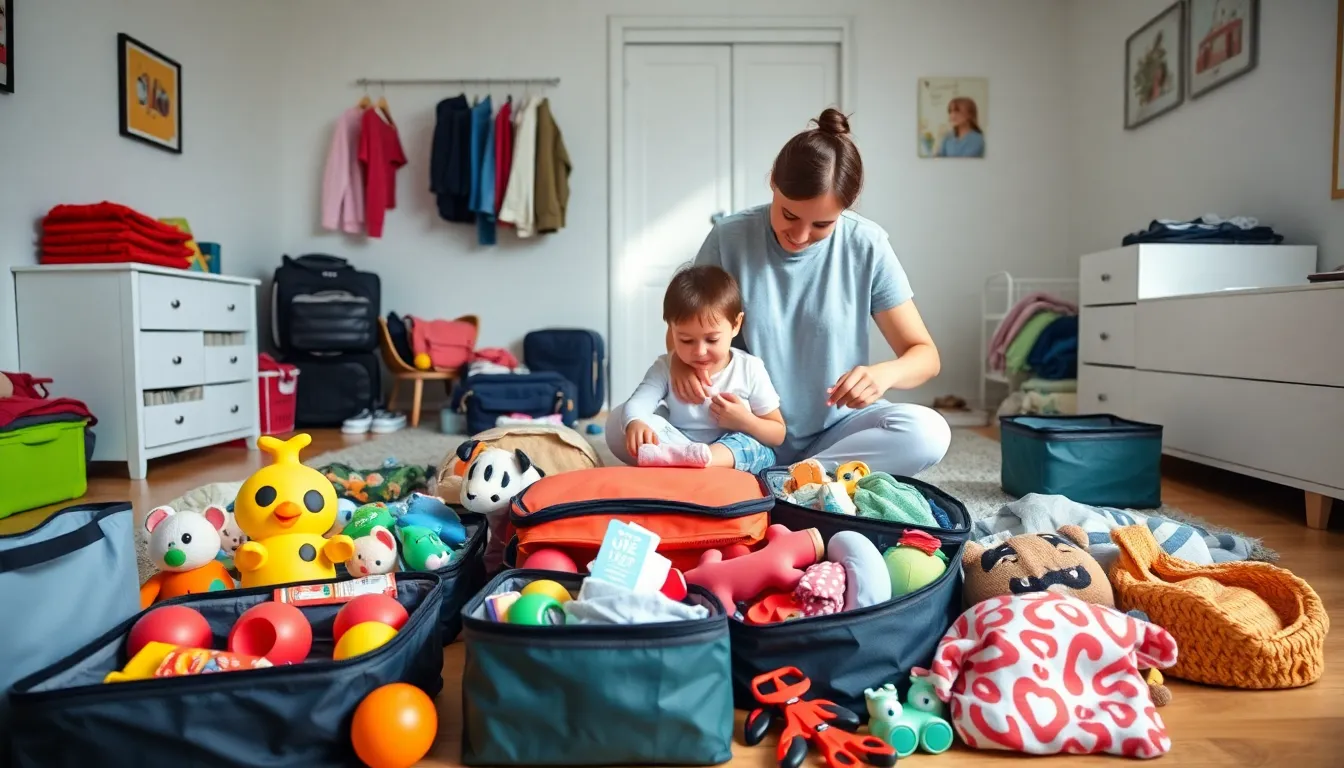Traveling with young kids can feel like a high-stakes game of Tetris, where every piece must fit perfectly to avoid chaos. From packing snacks to dodging tantrums, parents often wonder if a relaxing vacation is even possible. But fear not! With a little planning and a sprinkle of humor, family adventures can transform from daunting to delightful.
Table of Contents
TogglePlanning Your Trip
Planning a trip with young kids requires attention to detail and an understanding of family dynamics. Every choice can shape the travel experience, making careful consideration essential.
Choosing a Family-Friendly Destination
Select a destination that offers activities suitable for children. Theme parks, nature reserves, and beach resorts often provide entertainment tailored to younger audiences. Accessibility also matters; opt for locations with family-friendly amenities such as restaurants with children’s menus and accommodation featuring play areas. Research local attractions before deciding. Gathering information on kid-friendly activities can streamline the trip and enhance enjoyment.
Setting Travel Dates and Budget
Establishing travel dates plays a crucial role in family excursions. Peak seasons often lead to crowded destinations, so consider traveling during off-peak times for a more relaxing experience. Budgeting covers transportation, lodging, and expenses for activities. Allocate funds not just for attractions but also for food and emergency needs. Prioritize flexibility in the budget to account for unexpected costs, ensuring a smooth journey for the entire family.
Packing Essentials

Packing for travel with young kids requires strategic thinking and organization. Parents should prioritize items that ensure comfort and engagement throughout the journey.
Must-Have Items for Young Kids
Snacks remain a crucial component, as kids often get hungry during travel. Activities such as coloring books, puzzles, or travel games keep them entertained. Clothing items should include extra layers and a favorite blanket for comfort. Diapers and wipes are essential for younger children, offering convenience during stops. Finally, don’t overlook a first-aid kit to address minor health issues.
Tips for Efficient Packing
Utilizing packing cubes helps organize items by category and age. Creating a checklist ensures no vital items get forgotten. Involve kids in the packing process, allowing them to choose their essentials. Rolling clothes instead of folding saves space and minimizes wrinkles. Lastly, pack a dedicated bag for in-transit entertainment, providing easy access to toys and devices.
Transportation Options
Selecting the right transportation method enhances travel with young children. Each option has unique benefits to consider.
Traveling by Car
Traveling by car allows for flexibility and convenience. Families can pack necessary supplies, including snacks and games, creating a comfortable travel environment. Taking breaks every two hours reduces fatigue and provides a chance for kids to stretch. Engaging children with audio stories or sing-alongs keeps them entertained. Parents can plan routes with family-friendly stops, like parks or interesting attractions, to make the journey enjoyable.
Flying with Young Kids
Flying with young kids presents its own set of challenges. Booking flights during non-peak times minimizes stress and crowds. Seating arrangements matter; selecting bulkhead seats offers extra space for young travelers. Packing a carry-on with essentials helps, including snacks, toys, and extra clothing. Utilizing stroller services at airports simplifies the travel process. Arriving early ensures a smoother experience, providing time for security checks and bathroom visits without rushing.
Accommodation Strategies
Finding the right place to stay plays a crucial role when traveling with young children. Families can enhance their travel experiences by choosing accommodations that cater to their specific needs.
Family-Friendly Hotels and Rentals
Look for hotels that provide family-friendly amenities such as cribs, high chairs, or in-room kitchenettes. Opting for vacation rentals often offers added space and flexibility, making it easier for families to manage daily routines. Many rental properties come equipped with child-friendly features like toys or pools. Researching reviews can help identify accommodations that prioritize family needs. Booking through platforms that filter for kid-friendly options can streamline the process.
Packing Cribs and Baby Gear
Many hotels offer the option to rent cribs or pack ‘n plays for the duration of the stay. Parents should confirm availability in advance to avoid surprises upon arrival. Bringing baby gear, such as strollers or car seats, often simplifies transportation. Consider using collapsible or lightweight versions to reduce bulk. Shipping essential items ahead of time can alleviate baggage concerns too. Evaluating airlines for their gear policies could lead to significant savings. Using luggage services can also provide a hassle-free experience at airports.
Activities and Entertainment
Engaging young kids during travel proves essential for smooth experiences. Parents can incorporate a variety of activities to keep children entertained.
Keeping Kids Engaged During Travel
Interactive games offer a fun way to pass time during long journeys. Simple activities like scavenger hunts or car bingo can involve the entire family. Include audiobooks and kid-friendly podcasts to cater to different interests. Tablets loaded with games or educational apps provide another effective option for distraction. Packing portable art supplies ensures that kids can express their creativity during downtime. Always remember to break up travel time with frequent rest stops, allowing kids to stretch and play.
Best Activities for Young Kids at Destinations
Exploring parks or beaches creates opportunities for physical activity and play. Many cities feature children’s museums with interactive exhibits that captivate young minds. Zoos and aquariums offer exciting experiences, making animals come to life. Kids enjoy participating in local workshops, such as cooking or crafts, which enrich cultural experiences. Nearby amusement parks often captivate families seeking thrilling rides or entertaining shows. Parents can also research kid-friendly attractions before departure, ensuring a variety of suitable options.
Managing Expectations
Managing expectations during family travel can significantly enhance the experience. Parents must prepare for changes in plans and accept that travel with young kids often requires flexibility.
Flexibility and Importance of Breaks
Flexibility plays a crucial role when traveling with young children. Keeping schedules loose allows for unexpected events such as delays and changing moods. Frequent breaks offer kids a chance to recharge, reducing stress for everyone. It’s beneficial to plan rest stops to let children stretch their legs and explore. Finding parks or play areas along the route can serve as excellent refreshment points. Parents should weigh the importance of interrupting travel to foster a more relaxed atmosphere. Starting early in the day might also facilitate smoother travel before energy levels dip.
Communicating with Your Kids
Communicating with children about travel plans is vital for setting realistic expectations. Sharing details about upcoming trips helps kids understand what to expect. Encouraging questions can also ease anxiety and promote excitement. Simple language should clarify travel procedures like packing, flying, or driving. Role-playing scenarios, such as boarding an airplane or staying in a hotel, reinforces the experience. Parents can use visual aids, such as pictures of destinations, to create anticipation. Allowing kids to share their input on activities fosters cooperation and enthusiasm, leading to a more enjoyable trip.
Traveling with young kids can be a rewarding adventure filled with cherished memories. By embracing the chaos and planning thoughtfully, families can navigate challenges with ease. Prioritizing flexibility and keeping kids engaged makes the journey smoother and more enjoyable.
Finding suitable accommodations and transportation options tailored to family needs is essential for a stress-free experience. Encouraging open communication with kids helps set expectations and fosters a sense of excitement.
With a little preparation and a positive attitude, family vacations can become the highlight of the year, creating lasting bonds and unforgettable experiences.



